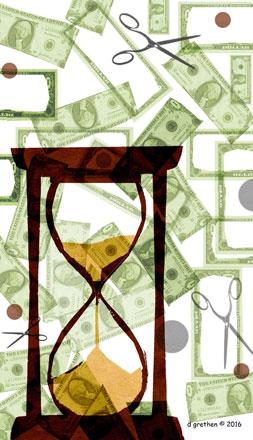You are here
Telecom tax hikes a step backwards on road to becoming ICT hub, telcos say
By Mohammad Ghazal - Feb 12,2017 - Last updated at Feb 12,2017

MCT illustration
AMMAN — The recent tax hikes on the telecom sector will increase the burden on the “heavily taxed sector”; instead, it is vital to revamp the whole legislation and the taxation system governing it, according to telecom providers.
The newly introduced taxes represent an impediment to the advancement of the sector’s investments, and are likely to affect Internet penetration in Jordan, which is working towards becoming an ICT hub in the region, they added.
“By resorting to increasing taxes on the telecom sector to generate more revenues, the government is ignoring the core issues and challenges facing the economy…There are electricity and water thefts annually, and the volume of waste is huge. Why not to address these issues?” asked Raslan Deiranieh, deputy CEO and chief financial officer at Orange Jordan.
“Why is the solution to generate more revenues is to punish this successful sector?” Deiranieh told The Jordan Times in an interview this week, adding that the government has repeatedly referred to tax evasions.
Last week, the government scrapped a “100-per-cent sales tax exemption” on fixed and mobile Internet services, effectively raising the tax rate to 16 per cent, from 8 per cent.
Internet penetration reached 87 per cent by the end of the third quarter of last year, with some 8.6 million users, according to official figures.
In addition, the Cabinet decided to impose a JD2.6 tax on the purchase of new mobile SIM cards — prepaid or post-paid — as of February 15.
“We were promised by the government that there will be a revamp of all taxes and regulations governing the sector, as licensing fees are high and frequency fees are high,” said Deiranieh.
“All telecom operators are in debt at present, and if these promises are not fulfilled, the sector will be in a very bad shape in two years, and we won’t have more money to invest,” he warned.
The executive added that the government needs to look into the impact of digital economy, as reservations of hotels, tickets, purchase of apps and many things are now being done online.
“I believe the government is revolving around the problem and is not directly focusing on more direct and clear challenges…Why it is not addressing shortcomings in other sectors such as water and electricity thefts and making the telecom sector pay for them instead?” he charged.
Umniah CEO Ziad Shatara said the recent government decisions in the telecom sector were the exact opposite of the company’s expectations, especially since the sector is heavily taxed.
“Increasing taxes will increase the burden on citizens and hamper the spread of and increased reliance on Internet and telecom services,” Shatara said in a statement to The Jordan Times.
He called for reviewing taxes on the sector and studying the imbalances in taxes.
“The policy of increasing taxes on the sector over the past years has had short-term results, but these temporary solutions have had side effects on the medium term…We are going back to square one, as the sector’s revenues have drastically decreased over the past years and have negatively affected the Treasury’s revenues,” said Shatara.
He said the telecom sector in Jordan is subject to different taxes that are considered the highest in the region, adding that telecom companies have discussed other options with the government and the Lower House.
The telecom sector contributes around 14 per cent to the gross domestic product every year and employs more than 60,000 people.
Related Articles
AMMAN — Telecom companies on Wednesday decried the government’s plan to raise income tax on the “heavily-taxed” sector, whose profits h
The government on Wednesday said it was still studying the impact of doubling the tax on mobile subscriptions, while a source in the telecom industry said the authorities are expected to reduce the tax.
AMMAN — Regulations governing Voice over Internet Protocol (VoIP) services are expected to be issued soon, according to the Telecommunicatio















